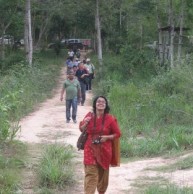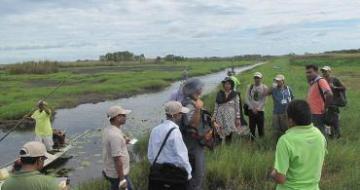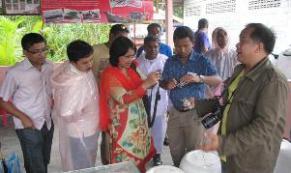Exploring Successful Co-Management of Protected Areas and Wetland Conservation

For more information about our training courses, please click here.
Co-management and participatory approaches in natural resource management are frequently successful in finding solutions for all stakeholders, and examples from Thailand are an interesting case in point. Some of these experiences were shared with Bangladeshi delegates during a RECOFTC study tour held on 1 – 9 July 2012.
The tour on “Protected Area Co-management and Wetland Conservation Strategy in Thailand” was for 11 Bangladeshi delegates from the Integrated Protected Area Co-Management (IPAC), a project funded by USAID. The delegates were nominated by the four ministries of Environment and Forests, Fisheries and Livestock, Planning, and Finance.
The learning objectives of the program included:
- Gaining knowledge of forest co-management and wetland conservation strategies in Thailand,
- Understanding how multiple stakeholders manage protected areas and wetland sites through participatory processes,
- And exploring how community based natural resource management works in Thailand in order to support sustainable livelihoods.

The nine-day program covered four case studies and provided an opportunity to learn both through discussions and site visits by exploring. Delegates discussed their findings in groups, concluding with a discussion of lessons learned that can be applied and promoted in their home country.
“It was a very effective study tour. We learned many new things that we can use in our country.” – Mr. Md. Riaz Uddin (Assistant Chief, Agriculture, Water Resource and Rural Institution Division)
Day One introduced the delegates to two experts from the Office of Natural Resources and Environmental Policy and Planning, of the Ministry of Natural Resources and Environment, who discussed Thailand’s policies on climate change and wetland management. They learned concepts of co-management from a RECOFTC trainer and identified 13 basic principles for successful co-forest management.
The first site visited was Kui Buri National Park in Prachuap Khiri Khan Province, where the co-management process has successfully mitigated conflict over resources – in this case between humans and wild elephants. The national park built awareness by engaging local people in principles of natural resource management, and by setting up a local eco-tourism group. Local people now make efforts to save wild elephants and like them to stay in the area.
Next, heading to the south, the delegates visited the first wetlands Ramsar Convention[1] site of Thale Noi Lake. Traveling by boat to get a close-up view of the wetland ecosystem, the delegates visited several distinctive topological areas: swamp forest, Melaleuca forest, water bodies, moist evergreen forest and agricultural lands. The area is important for bird nesting and feeding. Local people depend on the lake’s resources for their livelihoods, with many engaged in fishing and tourism. Here the delegates also investigated examples of alternative livelihoods promotion. One example, organic farming, was introduced in order to reduce pressure on wetland resources.

The group took a boat to explore nature and biodiversity around Thale Noi Lake. They stopped at nesting places for domestic and migratory birds, as Thale Noi Lake has several Important Bird Areas (IBAs).
Moving to Trang Province, known for its strong participatory natural resources management, the delegates observed co-management at work in conserving the marine and coastal resources in Libong Sub district. Ta Libong Island is an important habitat for dugongs, a rare marine mammal, and many sea grass beds. The delegates learned of the success that the Traditional Fishermen Club of Trang Province has had in local management. Thanks to their efforts, local opinions and initiatives were considered in policy reform at both the provincial and sub-district levels, for instance the Tambol Administrative Organization of Libong – TAO Libong agreed to local requests by announcing the “the Regulation of TAO Libong on Conserving Dugongs in 2012.”
“This program is very useful to learn about
co-management in marine and coastal resource management and wetlands & biodiversity conservation,” – Mr. Muhammad Muzahidul Islam (Senior Chemist, Department of Environment)
The group took a boat to explore nature and biodiversity around Thale Noi Lake. They stopped at nesting places for domestic and migratory birds, as Thale Noi Lake has several Important Bird Areas (IBAs).The delegates met with relevant organizations working on coastal resources conservation and management with the local communities in the province to exchange experiences. These agencies provide support in a variety of ways, such as setting up volunteer groups; organizing awareness-building activities; defining community and sanctuary forest boundaries; arranging youth camps; organizing exhibitions; and promoting alternative livelihoods.

The last site visit was to the Ban Nam Rap community, where conservation and sustainable livelihoods are reflected in the community’s replacement of destructive fishing practices with more sustainable ones. The delegation was shown many different schemes and systems for the co-management of resources: local regulations on coastal resource use; defining prohibited and banned fishing activities; setting up a mangrove community forest committee; establishing a volunteer patrolling group; promoting a crab bank; and providing marketing support and boat maintenance for fishermen.
At the end of program, the delegates reflected on the lessons learned from each site visit. Many found the program had clear objectives, appropriate content, and good case studies, all of which promoted their learning.
“It was a nice program, well organized and knowledgeable. I think now I can do better for management and conservation of our natural resources as well as for livelihoods developments.” – Mr. Mohammed Jahangir Alam (Upazila Fisheries Officer, Department of Fisheries)
**********************************************************************************************************
RECOFTC study tours are learning events that provide practical experiences and knowledge for participants, to enhance the concept of people and forests working together. The aims of RECOFTC’s study tours are to exchange different experiences, open wider views on community forestry to audiences, and to allow participants to attain the necessary capacity to apply lessons learned in their work. Learn more about our capacity building programs on our training website.
[1] The Convention on Wetlands of International Importance, called the Ramsar Convention, is an intergovernmental treaty that provides the framework for national action and international cooperation for the conservation and wise use of wetlands and their resources. For more information, please visit http://www.ramsar.org.

